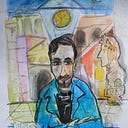Purgatorial awareness
The feet follow where the mind leads. For the medievals, the afterlife was not always a place, but a state to be in. Not a place of timelessness, but an existential frame of mind.
If Hell is all about evil colonising the mind and Heaven about the self transcending all possible notions, language and affection, then Purgatory is about perfect awareness, a kind of endless meditation, a mind detox aimed at boosting awareness of self and of others.
We can see this most clearly in Dante’s Purgatorio. Dante doesn’t have the language of mindfulness and awareness that our culture has grown so fond of. He has a better language, that of poetic invention, an idiom that can speak to everyone just as clearly and persuasively. Purgatory is where sin is purged on countdown, a high-intensity spiritual workout which has the potential to turn zero into hero, and a sinner into a dweller of Paradise.
Dante’s visit to Purgatory is not only touristic, but also self-enlightening. Just like in Inferno, and soon in Paradiso, the purgatorial lifeworld affects him as much as anyone else. He’s not above the law, though he might be less of a shadow, as a visitor, than everyone else. And as such, he needs a guide not only to understand what others are going through in there, but also to understand himself, his own journey and ascent. There is no infernal, purgatorial or paradisal view from nowhere. The object is the subject and the poet quam protagonist both acts and is acted upon.
As they make their way up the mount of Purgatory, Dante and Virgil encounter Statius, the ancient Roman poet, whose works, largely inspired by Virgil’s Aeneid, had enjoyed great popularity in the centuries leading up to Dante’s time. Dante takes a few facts from the historical record and weaves one of the most dramatic episodes in the entire Divine Comedy. Statius expresses his regret of not having ever met Virgil, his idol, in the afterlife, an honour he would’ve gladly paid with extra time spent on the mountain. Dante immediately understands the irony of the encounter, and that Statius is in for a big surprise. However, Virgil forbids Dante to disclose the truth. Nonetheless, the latter is unable to control his emotions. Dante’s mouth curls into a smile, which, however imperceptible, is picked up by Statius, whose purgation had allowed him to achieve a state of perfect awareness and spiritual plenitude. Statius quickly figures out that something is off and questions Dante about the smile. Finally, Dante lets the cat out of the bag, which causes Statius to try and bow in admiration and humility before Virgil, who stops him.
In Statius, we have the purged sinner, the accomplished athlete, the redeemed inpatient, whose senses have been sharpened in the shadow of the mountain. Soon he may not need them at all in his starbound journey. But transumanar, Dante idea of transcending humanity in the Heavens, presupposes perfect consciousness and unity of mind.
